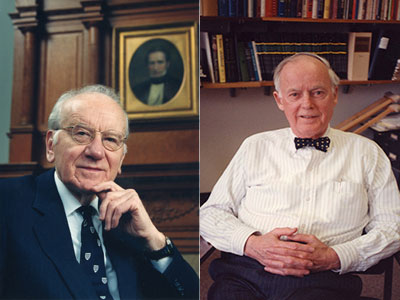Program Information
 Victor A. McKusick, MD (left) and Barton Childs, MD
Victor A. McKusick, MD (left) and Barton Childs, MDProgram History
The postdoctoral training program in medical genetics at Johns Hopkins was established by Victor McKusick MD in 1957. Three years later, Barton Childs MD accepted his first postdoctoral fellow in Pediatric Genetics. The predoctoral training program in Human Genetics began in 1961 and was combined with the postdoctoral programs in 1968. Fellowship training in Medical Genetics continued separately in Pediatrics and Medicine until 1975 when the two training programs were combined. The training program offered 2 or 3-year fellowships, in which each year had a mixture of clinical and research activities until 1980 when the program began offering standard three-year fellowships to optimize genetics research experience of the trainees. This decision has contributed directly to the outstanding success of the program in attracting and training some of the most productive physician-scientists in the field of medical genetics.
The integration of medical and pediatric genetic programs continued with the formation of the Center for Medical Genetics in 1989. Clinical inpatient and outpatient services were joined to provide a seamless approach to patients with genetic disorders. This was a particularly important development in light of the familial context in which many genetic disorders occur. Genetics attending physicians and clinical fellows diagnose and care for patients of all ages. Interaction among clinical departments was further enhanced by the consolidation of clinical and research activities in medical genetics in the McKusick-Nathans Institute for Genetic Medicine | Department of Genetic Medicine. The Institute facilitated interactions among the major clinical departments participating in this program: Pediatrics, Internal Medicine, and Obstetrics & Gynecology. A major strength of the Institute is that it accommodates faculty from many different disciplines. All participating faculty have primary or secondary appointments in additional departments at Johns Hopkins that complement the core training activities in the Department of Genetic Medicine. These faculty members contribute to the diversity of research expertise and clinical exposure afforded to the physician-scientist trainee. Integration between research and the bedside are further enabled by the physical location of the Department of Genetic Medicine. The research laboratories and offices of the Faculty of the Department of Genetic Medicine occupy two floors in the Edward D. Miller Research Building, a state-of-the-art research building that is contiguous with both the Hospital and Basic Science buildings on the East Baltimore campus.
In 2001, the combined Pediatrics/Medical Genetics residency program accepted its first trainee. In 2005, the combined Internal Medicine/Medical Genetics residency program, and combined Maternal Fetal Medicine/Medical Genetics fellowship programs received Board approvals. In 2010, the categorical medical genetics residency-training program joined ACGME accredited programs in the US in the NRMP Fellowship Match. In 2012, a residency training consortium in medical genetics between Johns Hopkins University and National Institute of Health was formed to greatly expand both clinical and research training opportunities and prepare the trainees for the ongoing challenges and rapid advancements in the fields of genetic and genomic medicine.
Goals
The Johns Hopkins University School of Medicine Medical Genetics Residency program provides ACGME-approved clinical genetics residency leading to ABMG certification and intensive mentored research training in medical genetics and genomics to prepare the trainees to compete for research funding and an academic career in genetic medicine. Residents will acquire a solid knowledge base in basic principles of human genetics and genomics, gain a deep appreciation for the extensive complexity and heterogeneity of genetic contribution that are inherent to all diseases, achieve high levels of ACGME core competencies in medical genetics to care for patients with the full spectrum of genetic disorders and predispositions, acquire necessary teaching skills that contribute to the integration of genetics to medicine, and are competent in cutting-edge clinical and/or basic research in medical genetics to play a leadership role in the future of genetics and genomics medicine.
Statements on Diversity and Disabilities
The Johns Hopkins University is committed to creating a welcoming and inclusive environment for students, trainees, faculty, staff, and visitors with disabilities. The University does not discriminate on the basis of race, color, sex, religion, sexual orientation, national or ethnic origin, age, disability or veteran status in any student program or activity, or with regard to admission or employment. The University works to ensure that all students, employees and visitors with disabilities have equal access to university programs, facilities, technology and websites.
